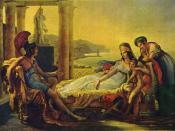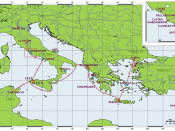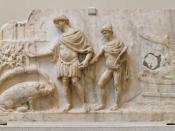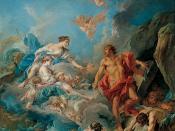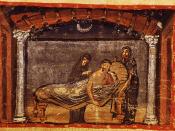The Intro: lines # 1-11 These first eleven lines are very important in the development of The Aeneid. They portray important historical background information which is vital while reading the epic. We enter the story being educated on the life of a man, Aeneas, who has survived the Trojan War and has become a hero to his men and people, but due to the persistent wrath of a particular goddess, Juno, his journey to fulfill his destiny and establish the city of Rome has been severely altered. This proves its importance because it establishes the basis for the story. This section cites the hardships that were endured by the protagonist, including the Trojan War and the gods' angers, which consequently helps the reader relate Aeneas's quandaries to his own troubles where it literally felt as if "the Gods were against him." Because of the elaborated development of the problems that faced Aeneas, the reader tends to pity him.
Although having only read eleven lines, the reader is emotionally engulfed in the thus far sad tale of a warrior who was forbidden to return home.
Juno's Jealousy and Anger: lines # 12-33 Again we see the chronic anger of the Queen Goddess Juno, however now it is justified with supporting information. The author tells us the causes through his "necdum etiam"æGanymedis honores-" (ln 25-28) which include Paris not selecting her as the most beautiful, her rejected beauty, Ganymede being snatched away, and the Roman race which will, by fate, overthrow her beloved Carthaginians and conquer most of the European area and surroundings.
In the beginning of this segment of The Aeneid, Virgil continues his lecturing on the ever-so important background information. He goes on to tell the readers of a sacred place "which Juno is said to have cherished more than all lands alone with Samos having been considered less important" (quam Iuno"æcoluisse Samo) (ln 15-16). Samos being her most adored city which holds her chariot and many temples dedicated to her. Virgil explains that this sacred place, Carthage, will be overcome by a superior race rooting from Aeneas. The reader finally understands the much-anticipated motive for the bizarre wrath of Juno. It is obvious that by her preventing Aeneas to land on Latium, the Roman race will never be launched, therefore never destroying her Carthaginians. Although the reader sees a justification in her upset behavior, he completely contrasts with her in her plan to wipeout Aeneas and his fleet. A reoccurring theme rises through this predicament stating that one cannot alter others' destiny. The fates are always right and nothing can be done to prevent them from their occurrence.
A very important and fabulous line is added to the end of this portion of this epic. On line 33, it states "Tantae molis erat Tomanam condere gentem" or it was such as great task as to found the Roman race. This line is filled with passion and emotion which sends a vibe out and grasp onto something. This is one of my favorite lines. Here Virgil is referring to the previous line where it explains how Juno has thrashed Aeneas and his men all over the Mediterranean Sea longing for them not to find their destined way to Italy where they will construct Rome. He is saying that despite being only a mere mortal, Aeneas will overcome the wrath of a furious goddess which is close to impossible. The efforts that Aeneas will put forth in the future are astounding and incomprehendible. His mentality to know that he will defeat an immortal and destroy her beloved race is amazing. This line, filled with excitement and fury, defines the outcome of the epic.
The Trojans Leave Sicily for Italy: lines # 34-49 As Juno rambles continually about the unjust treatment of her not being able to destroy Aeneas and his fleet, the reader realizes why she is the antagonist thus far in the story and why she is not well liked. Juno complains, in a childish manner, how it is unfair that Athena was able to kill the all of the people of Ajax whom she so desires because a crime that he committed against her, and she is powerless in respect to her grudge opposing Aeneas and the Greeks to whom she has "been waging wars [with] for so many years" (tot annos bella gero) (ln 47-48). Her whining not only makes the reader think even poorly of her character, but forces him to despise her and her childish demeanor. Meanwhile, Aeneas and his crew express themselves happily as they sail closer in the direction of the main land of Italy. This positive change was for the betterment for I was becoming annoyed with Juno and her constant immature attitude towards everything.
Juno Appeals to Aeolus, God of the Winds: lines # 50-80 This sector leads up to a very important event that drastically alters the path that Aeneas is sailing as well as the course of the epic. As Aeneas and his men are happily sailing to await their destinies in Italy, Juno brews up another evil plan that will prevent Aeneas to land at Lacium. She visits Aeolus, god of the winds, and, through flirtaecous actions, gets him to release his winds for her in return for beautiful nymphs. Juno abused her power as the queen goddess to influence this lesser god to do her a favor. Although he could have easily refused her offer, the reader sees that Aeolus was somewhat frightened by Juno and her request, so he succored in to her demands. But more importantly, the reader can clearly observe that Aeolus's loneliness due to being the sole human in his kingdom in the "mass of high mountains" (molemque et montis insuper altos) (ln 61) played a factor in his release of the winds, so his lascivious desires overcame his logical thinking and he preferred the 14 nymphs, especially Deiopea, to his cold lonesome days on the mountain. Juno's childish manner can easily be seen here again as she conjures up and compels Aeolus to release his winds so that they may destroy the fleet of Aeneas. It proves that she will make Aeneas suffer at all costs, resorting to taking advantage of a lonely king so that she can prolong the inevitable landing in Italy by Aeneas.
Comparison of Aeolus and Neptune Concerning Kingly Qualities Although the reader takes pity on Aeolus being a lonesome king on the top of his high mountain, one can't help but to be infuriated with his actions. Even though he was friendless, Aeolus had a contract with the almighty Apollo to control the winds by means of locking them away with chains in a prison. Although Aeolus's loneliness may have contributed to his poor decision to release the winds, it is not the sole factor. It appears, though Aeolus is a god himself, that he wishes to have more claim and glory for the hard task of maintaining the winds. And that he turned over the power of the winds not only to satisfy Juno's lust for Trojans death, but to possibly send a message to the world that he is a powerful god who deserves acclaim and is not a force to be reckoned with. This behavior forces the reader to think less and less of Aeolus, in that the only way for him to be praised and honored is for him to brutally destroy and murder many innocent men. Aeolus does not even deserve the respect of a rat, more or less the respect given to the almighty and powerful gods from Mount Olympus.
Neptune, however, is in complete contrast with Aeolus. He only punishes those who need punishing and who were disloyal to the gods or their race. Neptune proves himself to be a worthy god by his peaceful actions. As it says in line 127 "he raised his peaceful head from the top of the wave" (summa placidem caput extuit unda). Neptune sensed disturbance on the surface and went to calm the waves when he realized that the storm was caused by Aeolus's release of the winds. This greatly angers the god of the seas in that he orders the winds to return to their home and give Aeolus a message concerning his inappropriate actions. He makes the waves look ludicrous as he angrily belittles them and their king. The reader feels similarly to Neptune in his harsh, but necessary attitude towards the winds and Aeolus. The reader also finds it amusing how the wrath of the winds ceased when they caught sight of him. They winds, though in an awkward situation, respect this god unlike any other god, including their king.
The Storm Shatters Aeneas's Fleet: lines # 81-123 Here the reader is first introduced to Aeneas himself. We expect to hear a great soliloquy of either his troubles since the war ended attempting to land on Italy or a passage relating to his years of service throughout the Trojan War. However, the reader is shocked when Aeneas first speaks to us in a cold, pessimistic demeanor. "Oh three and four times blessed are those people to whom it happened to encounter death before the high walls of Troy!"æWhy couldn't I lie down in the fields of Troy and pour out this spirit of mine"æ? (O terque quaterque beati"æoppetere!"æmene Iliacis"ædextra) (ln 94-98). The reader is confused why Aeneas wishes to have died during the battles at Troy. His distaste in his poor, wretched life bewildered the reader and leaves a mark on the character of who he really is. Aeneas wishes to have died on the battlefield in Troy because that would be an honorable death; a sacrifice of one's body for his country. Instead, Aeneas has to live with the fact that his city was brutally defeated by means of a wooden horse. The shame that lies in that fact alone drove Aeneas mad. In addition, Aeneas knows, through the fates and prophecies, how he will die many years from now. This leads him to a depressed state of mind because he knows that he will not die honorably serving his people.
An Angry Neptune Ends the Storm: lines # 124-156 The thrashing of the wave, caused by the fury of Aeolus's winds, has come to a halt when the winds catch sight of Neptune, the god of the sea and waves. As the waves die down, Neptune sternly punishes the winds and orders them to relay a message to Aeolus who released them upon Juno's wishes, and sends them away. Meanwhile, Aeneas's fleet is freed the sandbar and sharp rocks with help from Cymothoe and Triton. This marks the beginning of an interesting simile comparing the raging waves to a riot of the common people and Neptune to the people's leader. Virgil shows the fury of the waves and the madness that Aeneas's fleet had to survive through a comparison to a roaring riot where "torches and rocks fly" (faces et saxa volant) (ln 150). Yet through all of this confusion and pandemonium, the people become silent when "some man, serious in respect to pietas and merits" (pietate gravem ac meritis si fore virum quem) (ln 151) walks before the crowd. This part is so moving that there are qualities of Neptune's character and personality that we cannot accurately translate into English because we cannot fully understand the qualities that they represent. The reader is struck by this fact and is blown away with awe.
The Trojans Land in Africa: lines #157-179 Restless after suffering the long, enduring storm created by the freed winds, Aeneas and his men rest their bodies on the sand that they all long to lie upon. Virgil quite specifically describes the island with intense details. He tells us that it is an island with a long inlet where they beach the seven remaining ships from the original twenty of Aeneas's fleet. He continues further to describe encircling cliffs that overhang the beach and that they are so tall that they touch the sky. The author continues with the description as the men are attempting to cook with their spoiled grains and other foods. This is an aspect that Virgil reiterates in this section concerning the common feeling of safety that the men of Aeneas have. However, this feeling of security and protection almost seems to foreshadow that a catastrophic event will soon come and haunt the men. It seems as if the safer these men feel, the worse times ahead of them will be.
